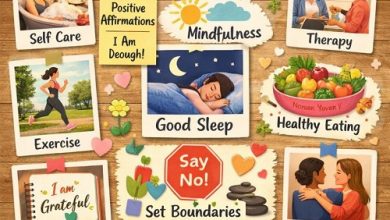How the Holiday Season Impacts Your Mental Health and What to Do About It

The holiday season is often painted as the “most wonderful time of the year”—a period filled with joy, laughter, togetherness, and celebration. Streets are lit up with decorations, families gather for meals, and the air buzzes with excitement and goodwill. Yet, for millions of people around the world, the holiday season can be emotionally complex, even distressing.
From loneliness and financial stress to seasonal affective disorder (SAD) and family tensions, the holidays can take a significant toll on mental health. Understanding how this time of year affects you—and learning strategies to protect your emotional well-being—can make all the difference in experiencing a truly meaningful and balanced holiday season.
1. The Emotional Paradox of the Holidays
The holidays create a unique emotional paradox. On one hand, they promise happiness, connection, and celebration. On the other, they amplify stress, sadness, and unmet expectations.
For some, the holidays bring nostalgia and joy; for others, they evoke loss, grief, and anxiety. Even people who look forward to the festivities may find themselves feeling drained by the social obligations, financial pressures, and emotional intensity that often accompany this season.
Why the Holidays Are Emotionally Intense
- Cultural Expectations: Society promotes an idealized image of happiness during the holidays. If your reality doesn’t match this image, feelings of inadequacy can surface.
- Comparison and Social Media: Seeing others’ “perfect” holiday moments online can make you feel left out or that you’re not doing enough.
- Emotional Memories: The season can trigger memories of loved ones who are no longer here, or past holiday experiences that were stressful or painful.
- Pressure to Be Happy: There’s an unspoken expectation to feel festive. This pressure can lead to guilt or self-criticism when you don’t.
This emotional push-and-pull can cause many people to feel “off” during a time that’s supposed to be joyous—leading to what experts call the holiday blues.
2. Common Mental Health Challenges During the Holidays
While everyone experiences the season differently, several key stressors tend to affect mental health during the holidays. Understanding these can help you identify your personal triggers and take proactive steps to manage them.
a. Stress and Burnout
Between shopping, planning, cooking, and attending events, the holidays can feel like a full-time job. The result? Overwhelm, irritability, and exhaustion. According to the American Psychological Association, nearly 38% of people report increased stress during the holidays due to time constraints, financial demands, and the pressure to provide a memorable experience for others.
b. Financial Strain
Gift-giving, travel, and hosting gatherings can quickly add up. The fear of not being able to afford the “perfect” holiday can create significant financial stress, especially for those already living paycheck to paycheck. This stress may worsen feelings of anxiety or even lead to depression.
c. Loneliness and Isolation
Despite the emphasis on togetherness, many people feel deeply lonely during the holidays. This includes:
- Individuals living far from family or friends
- Seniors who have lost loved ones
- People recently separated or divorced
- Those who struggle with social anxiety
Social isolation can worsen symptoms of depression and make the holiday season feel empty or meaningless.
d. Grief and Loss
For people mourning the loss of a loved one, holidays can reopen emotional wounds. Empty chairs at the dinner table and memories of past celebrations can make the absence feel especially painful.
e. Family Conflict
Gathering family members under one roof can be a recipe for tension. Old arguments, unresolved issues, or differing political and religious views may resurface. This can lead to anxiety before family gatherings and emotional exhaustion afterward.
f. Seasonal Affective Disorder (SAD)
Shorter days and limited sunlight in winter can lead to Seasonal Affective Disorder, a form of depression that occurs during specific seasons—usually winter. Symptoms include low mood, fatigue, sleep disturbances, and changes in appetite. For some, SAD amplifies the emotional challenges already present during the holidays.
g. Substance Misuse
The holidays often bring more opportunities for alcohol consumption. While some people drink socially, others may use alcohol or other substances to cope with loneliness, stress, or emotional pain. This can worsen anxiety, depression, and impulsive behavior.
3. How to Recognize the Signs of Holiday-Related Stress or Depression
It’s not always easy to know when normal holiday stress has turned into something more serious. However, recognizing the warning signs early can help you seek help before things worsen.
Emotional Signs:
- Persistent sadness or irritability
- Loss of interest in activities you normally enjoy
- Feeling overwhelmed, anxious, or hopeless
- Guilt about not feeling “happy enough”
Physical Signs:
- Fatigue or lack of energy
- Changes in appetite or sleep patterns
- Headaches or stomach issues
- Tension in the body
Behavioral Signs:
- Withdrawing from friends and family
- Increased alcohol or drug use
- Procrastination or lack of motivation
- Avoiding social events altogether
If these symptoms persist beyond a couple of weeks, it may indicate depression or anxiety that deserves professional attention.
4. Why We Feel Lonely During a Time of Togetherness
Loneliness during the holidays isn’t always about being physically alone—it’s about feeling emotionally disconnected. You can be surrounded by people and still feel isolated if those connections don’t feel meaningful or supportive.
Social scientists suggest that loneliness peaks during the holidays because:
- We compare our relationships to others’ idealized portrayals.
- We feel excluded from the collective joy.
- We experience nostalgia for past connections that no longer exist.
- We expect more emotional fulfillment than reality provides.
Understanding that loneliness is a common human experience—and not a personal failure—can help reduce its emotional impact.
5. Strategies to Protect and Improve Your Mental Health During the Holidays
The good news is that with awareness and intentional action, you can navigate the holiday season in a way that supports your mental well-being. Here are practical, research-backed strategies that can make a real difference:
a. Manage Expectations
Don’t aim for a “perfect” holiday—aim for a peaceful one.
Perfectionism fuels disappointment. Focus on what truly matters to you and your loved ones rather than adhering to unrealistic cultural standards.
Try this:
Make a list of three things that make the holidays meaningful for you—such as spending time with close friends, volunteering, or simply resting—and center your plans around those.
b. Set Financial Boundaries
You don’t need to overspend to show love. Handwritten notes, homemade gifts, or shared experiences can be far more meaningful than expensive items.
Practical steps:
- Create a realistic budget and stick to it.
- Use cash instead of credit cards to avoid overspending.
- Propose gift exchanges or “Secret Santa” to reduce pressure.
c. Prioritize Rest and Self-Care
The holidays can easily disrupt your sleep and self-care routines. But rest isn’t a luxury—it’s essential for emotional balance.
Tips for self-care:
- Keep a consistent sleep schedule.
- Eat balanced meals and stay hydrated.
- Take short walks outdoors for natural sunlight and endorphin boosts.
- Schedule “quiet time” daily to recharge.
d. Maintain Healthy Boundaries
It’s okay to say no to events, conversations, or people that drain your energy. Setting boundaries is an act of self-respect, not selfishness.
Examples:
- Politely decline gatherings that cause stress.
- Excuse yourself from triggering conversations.
- Limit time on social media if it fuels comparison or anxiety.
e. Stay Connected—Meaningfully
Reach out to people who lift you up, even if only virtually. A phone call, video chat, or even a simple message can help you feel more grounded and connected.
If you feel lonely:
- Volunteer at a local shelter or charity—helping others fosters a sense of purpose and belonging.
- Join community or church events.
- Seek online support groups if you’re isolated geographically.
f. Practice Mindfulness and Gratitude
Mindfulness helps you stay grounded in the present moment rather than dwelling on what’s missing or worrying about what’s next.
Simple ways to practice:
- Start your day with deep breathing or meditation.
- Write down three things you’re grateful for each morning.
- Slow down and truly savor small moments—like the taste of a meal or the sound of laughter.
Studies show that gratitude can significantly reduce stress and improve mood, making it a powerful tool for emotional resilience during the holidays.
g. Seek Professional Support When Needed
If feelings of sadness, anxiety, or hopelessness persist, reaching out to a mental health professional can be life-changing. Therapists can help you develop coping strategies and provide support tailored to your needs.
If you ever feel in crisis—especially with thoughts of self-harm—contact your local emergency helpline or reach out to organizations such as:
- 988 Suicide & Crisis Lifeline (U.S.)
- Samaritans (UK: 116 123)
- Lifeline (Australia: 13 11 14)
- Or visit your nearest emergency room.
6. Supporting Others During the Holidays
Sometimes, the best way to nurture your own mental health is to help others. Small acts of kindness can improve mood, reduce loneliness, and foster connection.
Here’s how you can make a difference:
- Check in on friends or neighbors who might be alone.
- Offer practical help—like running errands or sharing a meal.
- Be an empathetic listener rather than trying to “fix” someone’s emotions.
- Encourage professional help if someone seems deeply distressed.
By creating a supportive environment, we help foster collective well-being and remind each other that no one needs to navigate the holidays alone.
7. Embracing the True Spirit of the Season
The essence of the holidays isn’t in gifts or parties—it’s in connection, reflection, and compassion. Slowing down to appreciate what truly matters can transform the experience from overwhelming to meaningful.
Reflect on these questions:
- What values do I want to honor this season?
- Who brings genuine warmth into my life?
- How can I give myself permission to rest and just “be”?
Let go of what doesn’t serve you—whether it’s people-pleasing, perfectionism, or guilt—and focus instead on presence, gratitude, and authenticity.
8. Key Takeaways: How to Stay Mentally Healthy This Holiday Season
- Acknowledge your feelings—it’s okay not to be okay.
- Set realistic expectations and don’t chase perfection.
- Stick to a budget and avoid financial overextension.
- Prioritize self-care—sleep, nutrition, and downtime.
- Establish healthy boundaries with people and obligations.
- Connect meaningfully with others or volunteer.
- Limit alcohol and substance use to maintain balance.
- Practice mindfulness and gratitude daily.
- Seek professional help if symptoms of depression or anxiety persist.
- Embrace compassion—for yourself and those around you.
Conclusion: Finding Peace in the Holiday Chaos
The holiday season can be both beautiful and difficult. It’s a time that magnifies emotions—both joyful and painful—and challenges us to find balance amid chaos. While cultural messages may push for constant cheerfulness, remember that it’s perfectly normal to experience a mix of emotions.
By acknowledging your feelings, setting boundaries, and focusing on self-care, you can navigate the holidays with greater calm and authenticity. Whether you spend the season surrounded by loved ones or quietly reflecting on your own, know that your emotional well-being matters.




